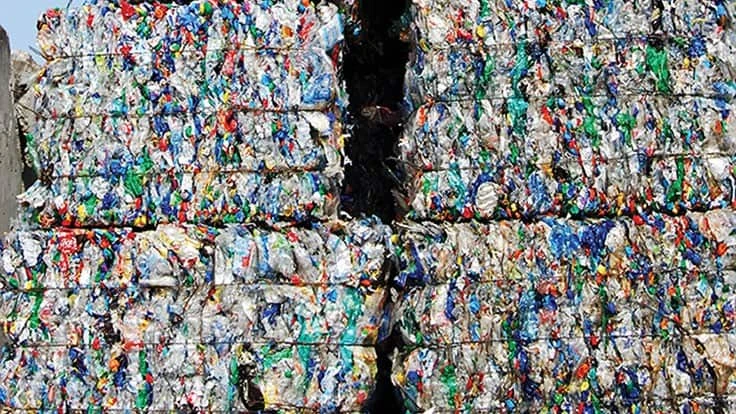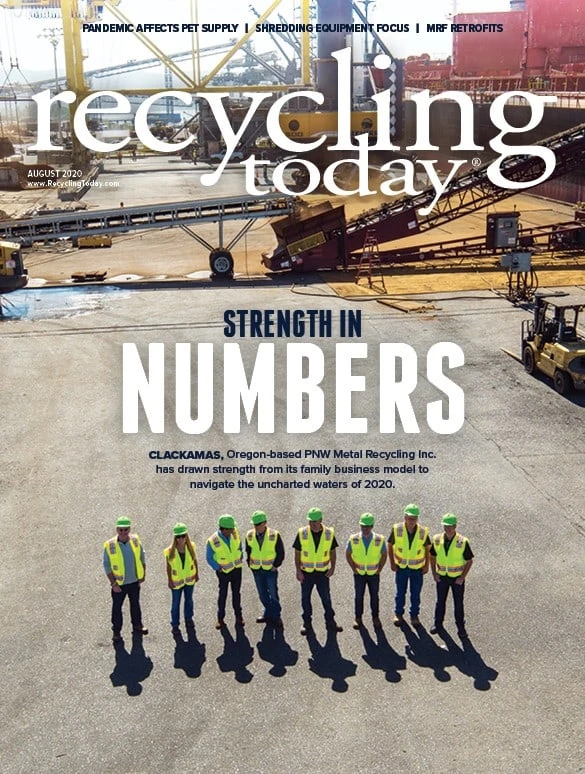
Dreamstime

Polyethylene terephthalate (PET) bottle reclaimers faced uneven supply in March and April as a result of stay-at-home orders and other measures instituted because of the COVID-19 pandemic. While supplies have begun normalizing this summer, reclaimers express concerns regarding collection rates and quality that will affect their ability to supply brand owners’ growing demand for recycled PET (rPET) going forward.
Taking a dip
“PET scrap availability has been affected recently by limitations in staffing at MRFs (material recovery facilities),” says Chad Bolick, global vice president of brand sales at Unifi Manufacturing, with corporate headquarters in Greensboro, North Carolina.
At its Repreve Bottle Processing Center in Reidsville, North Carolina, the company recycles PET bottles to create its Repreve branded polyester fiber. Additionally, it received a Letter of No Objection from the U.S. Food and Drug Administration in 2017, allowing the company’s rPET flakes to be used in making food-contact articles.
“Social distancing protocols and the fact that MRFs are not able to staff the way they normally would due to COVID-19 have impacted the quality and the availability of the product,” Bolick says of the PET bottle bales Unifi receives. “We are not able to yield as much from the bale as we normally would.”
A reprocessor based in the Northeast says his plant, which solely consumes bottles collected through redemption programs, saw supply take a “severe downturn” beginning in mid-March as most of the 10 states that have bottle bills allowed retailers to suspend collection of covered beverage containers. He estimates an 80 percent reduction in the availability of PET bottles collected through these programs through April and May, with things starting to normalize in June.
The reprocessor says some of these bottles went into curbside programs in his community based on his observations. Although, some people appear to have held onto these containers until they could redeem them; programs have had an above-average volume of returns in June and early July, he says.
The National Association for PET Container Resources (NAPCOR), which is based in Charlotte, North Carolina, urged consumers in bottle bill states to hold onto their PET bottles if possible when redemptions were restricted. Laura Stewart, NAPCOR communications director, says the organization also advised residents in areas where curbside recycling was affected by the pandemic to do the same.
Earlier this year, NAPCOR introduced Positively PET, a three-year social media campaign that began in Charlotte and in St. Paul, Minnesota, running through April. As of July, the program was running in Fort Worth, Texas, and Nashville, Tennessee. It incorporates paid social media, a microsite at https://positivelypet.org that offers information about PET and PET recycling and news media outreach.
Through the campaign, NAPCOR, which is comprised of companies operating in the United States, Canada or Mexico that manufacture PET resin or packaging or provide products or services to the PET industry, hopes to highlight the benefits of PET, including its recyclability.
Stewart says the pandemic hasn’t slowed the rollout of the campaign and has made its messaging that much more critical. “It was important to get the message out there, particularly while families were home,” Stewart says. The campaign stressed how to properly prepare PET bottles and containers for recycling and included activities for repurposing containers they couldn’t recycle for access reasons.
Phoenix Technologies LLC, a reclaimer based in Bowling Green, Ohio, doesn’t rely on deposit material, site manager Lori Carson says, and didn’t encounter supply difficulties. “With [commodity] pricing so low, though, many MRF processors are changing their pricing model,” she says, which has led some cities to suspend recycling services because of increasing costs.
Effects on pricing
While supply has rebounded since March, bottle bale pricing has not.
Carson describes pricing as of mid-July as “very low,” adding, “but that is a function of both low virgin pricing and lower overall demand, especially in the fiber markets.”
Rich Costa is director of procurement, sustainability and government affairs at CarbonLite Industries LLC, a bottle-to-bottle reclaimer with corporate offices in Los Angeles and processing plants in Riverside, California; Dallas; and Reading, Pennsylvania. He has worked in the PET industry since 2013 and says bottle bale pricing is at “historic lows” as of mid-July. “It’s the lowest I’ve ever seen it.”
He also mentions low virgin pricing and lower demand from the fiber markets as factors affecting pricing.
The reclaimer based in the Northeast says bale prices have taken a “nosedive,” adding that they are the lowest he’s seen since the Great Recession of late 2007 to mid-2009. “Virgin PET resin pricing is tied to oil and natural gas. If oil is cheap, generally resin is cheap.
“Most of the buyers that purchase recycled PET resin do it as a hedge against virgin,” he continues. “When virgin is very high, once in a blue moon, we can make money. When virgin is low, it puts a lot of us at risk.”
Low virgin PET pricing has the potential to affect rPET sales, as many costs that go into rPET production are fairly fixed. This has contributed to a decoupling of the virgin and rPET prices. Food-contact-grade rPET commonly sells at a premium to virgin material, which has the potential to challenge brands’ commitments to increase their use of this material in their packaging.
Still in demand
Despite the pricing advantage that virgin PET has, Stewart says it appears brand owners are standing by their commitments to use rPET in their packaging.
“One thing I do hear in talking to reclaimers and brands is that they realize this is short term,” she says. “This downturn and the pandemic are unprecedented, but they are keeping the faith that this time will pass and a sense of normalcy will return.”
Stewart says brands have come to see the value of rPET and understand that it is a unique brand itself. “This is a different product than virgin material. We are seeing that understanding take hold.”
She says brands are working with convertors and the overall supply chain to produce rPET products that meet their demands and specifications.
While Bolick says price is a factor in brands’ use of rPET, he adds, “however, the demand from consumers outweighs any additional cost.”
In his experience, “Demand continues to remain robust.” He adds, “Both brands and retailers are holding steadfast in their sustainability commitments. Sustainability is no longer an option but a requirement for companies as consumers demand products that are sustainably sourced and made.”
Carson says Phoenix also has been seeing strong demand for its rPET pellets, adding, “we are in packaging, and most of our customers were deemed to be critical business so they kept running; fiber is less so.”
Regarding brands’ commitments to rPET, she says pricing does not affect their strategy, “but it may slow down the process of increasing rPET into the brand mix.”
CarbonLite’s Costa says the company has seen steady demand for its rPET pellets.
Nestlé Waters North America (NWNA), Stamford, Connecticut, is among the companies CarbonLite supplies with rPET. That brand recently announced that three more of its U.S. still water brands— Ozarka, Deer Park and Zephyrhills—have started to convert their packaging to 100 percent rPET.
In a news release announcing the company’s move, David Tulauskas, vice president and chief sustainability officer of NWNA, says, “Bottles made with other bottles—like these—provide tangible proof that recycling works and the circular economy for plastics is achievable.”
With this change, NWNA says it has doubled the amount of rPET it has used since 2019 across its U.S. domestic portfolio to 16.5 percent, bringing it closer to achieving its goals of using 25 percent rPET across its U.S. domestic portfolio by 2021 and 50 percent rPET by 2025.
Collection and quality concerns
Leon Farahnik, CEO of CarbonLite, says his company supplies all the major beverage companies, adding that their demand has not faltered despite issues surrounding the pandemic and the low virgin PET prices. However, it could prove difficult for CarbonLite to secure enough rPET if collection rates don’t improve, he adds.
Farahnik says, “Unless our collection rate improves, I think that is going to be very hard to achieve. Collection is the biggest issue we will be facing in the future.”
He notes that the PET bottle recycling rate is only 29 percent, with deposit states accounting for the bulk of that material.
Farahnik and Costa say more bottle bills are needed to improve collection rates. “It has to be driven by legislation,” Costa adds.
Not only do bottle bills yield more bottles, the material also tends to be cleaner than curbside collected material.
Farahnik says the company’s yield from bottle bales from redemption programs can be 10 to 15 percent greater than from bottle bales produced by MRFs.
Carson says quality varies by MRF. “It is really MRF by MRF and not always the same across the board.”
While the reclaimer in the Northeast is in favor of bottle bills to increase the recycling rate, he says recycled-content legislation is needed first to create demand for the collected material.
He continues, “If recycled content legislation was passed, then as a secondary effect, we’d see more bottle bills.”
While a number of bills ranging from establishing recycled-content requirements and a nationwide bottle bill to investing in recycling infrastructure have been introduced at the federal level, the pandemic and issues surrounding it could impede their progress.
While reclaimers can hope for a legislative assist, in the meantime, they must contend with the challenges associated with the current environment.

Explore the August 2020 Issue
Check out more from this issue and find your next story to read.
Latest from Recycling Today
- BMW Group, Encory launch 'direct recycling’ of batteries
- Loom Carbon, RTI International partner to scale textile recycling technology
- Goodwill Industries of West Michigan, American Glass Mosaics partner to divert glass from landfill
- CARI forms federal advocacy partnership
- Monthly packaging papers shipments down in November
- STEEL Act aims to enhance trade enforcement to prevent dumping of steel in the US
- San Francisco schools introduce compostable lunch trays
- Aduro graduates from Shell GameChanger program





